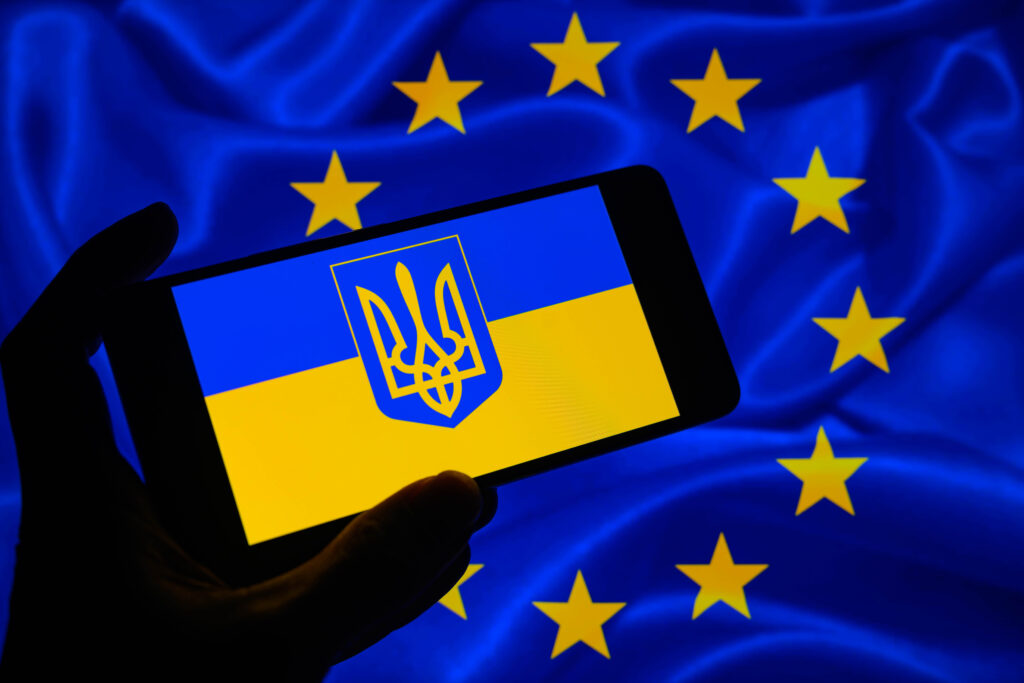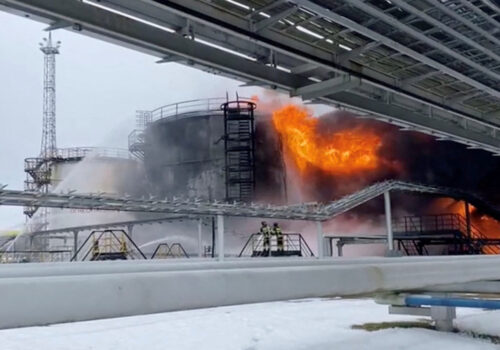
Ukraine expands EU energy exports in fresh display of wartime resilience

Since the beginning of March, Ukraine has been powering thousands of homes in neighboring European countries, exporting large amounts of clean energy from solar and hydro plants.
Data from Ukraine’s electricity grid operator, Ukrenergo, indicates that the country is making full use of its interconnection capacity to sell electricity to Hungary, Moldova, Romania, Poland, and Slovakia, with over 13 gigawatt hours (GWh) flowing across the border during daylight hours. Outflows are driven by ample renewable production in Ukraine at this time of year, which makes it commercially attractive to sell to EU markets during the day, when the country has surplus solar production. At night, flows tend to reverse, allowing Ukraine to import from Europe when internal production from other sources may be insufficient.
The fact that in spring 2024 Ukraine is not only able to produce electricity but also export to the EU at full throttle is testament to the country’s extraordinary wartime resilience. Over the past two years, Russia has attempted to destroy Ukraine’s energy infrastructure as part of Vladimir Putin’s full-scale invasion. These efforts have included a six-month campaign of intensified air strikes against power stations and transmission lines during the first winter of the war that caused widespread blackouts and plunged the country into darkness amid temperatures well below freezing. The World Bank estimates the cost of wartime damage to Ukraine’s energy sector at $12 billion, with attacks ongoing.
Ukraine’s renewable capacity has also been badly hit. Invading Russian forces have bombed or occupied approximately 90% of Ukraine’s wind capacity along with half of its solar plants, and are also accused of destroying the Nova Khakovka hydro plant, one of the largest in the country.
The human cost of keeping the lights on in Ukraine has been staggering. On the second anniversary of the full-scale invasion in February 2024, leading Ukrainian electricity producer DTEK stated that 252 of its employees had been killed while working to keep the system operational. Meanwhile, the company’s electricity infrastructure had sustained over 9,700 attacks in the past two years. DTEK’s experience is thought to be typical among Ukraine’s energy sector companies.
Stay updated
As the world watches the Russian invasion of Ukraine unfold, UkraineAlert delivers the best Atlantic Council expert insight and analysis on Ukraine twice a week directly to your inbox.
The Ukrainian energy sector has been demonstrating its resilience since the very first night of Russia’s full-scale invasion, when Ukraine unplugged from the old Soviet grid in preparation for planned synchronization with the rest of Europe. This set the tone for more wartime progress in the following months, with Ukraine fully connecting to European infrastructure and starting commercial flows to the region in summer 2022, more than a year earlier than expected.
Further advances were achieved during the second year of the Russian invasion. Ukrenergo managed to more than triple importing capacity from 500 megawatts (MW) in January 2023 to 1,700MW this year, while export capacity to Europe now exceeds 700MW per month, enough to power more than 700,000 homes.
Even as Russian missiles and drones were striking Ukraine’s electricity infrastructure, Ukrainian engineers were busy building a new interconnection line with Poland, which has facilitated the expansion of capacity. Similar works are planned with Romania and Slovakia, although details remain confidential for security reasons. Just as important has been Ukraine’s ability to align its own domestic regulations governing commercial flows with those of the EU, ensuring that import or export transmission capacity is allocated fairly and transparently.
Eurasia Center events

Ukraine’s efforts to expand its electricity interconnections with neighboring European countries will not only further increase its resilience, allowing it to import energy in case of shortages; it could also turn Ukraine into a major future exporter of clean energy to the region. Much will depend on Ukraine’s ability to rebuild the renewables sector by scaling up its installed wind, solar, biomass, and hydro capacity, and by deploying a nimble decentralized transmission system with self-contained clusters of production close to high-demand urban areas.
Ukraine’s potential for renewable power generation is almost unparalleled in Europe, with solar capacity alone thought to be capable of expanding to more than one-third of the EU’s existing total. Onshore wind plants could eventually be even larger, with the potential to make up half the EU’s current total of 255GW.
This large renewable potential, combined with Ukraine’s plans to expand its electricity interconnections with continental Europe, could provide a real boon to regional countries looking to break their addiction to polluting fossil fuels. However, none of this will materialise if Western partners fail to unblock financial and military support to protect Ukraine’s infrastructure and help the country defeat Russia.
Ukraine currently needs additional air defense systems to protect energy generation facilities and safeguard key parts of the country’s transmission infrastructure. The longer US and European partners delay sending aid, the easier it will be for Russia to undo Ukraine’s energy sector gains and jeopardize the safety of transmission lines connecting the country to the EU.
Over the past two years, Ukraine has more than proven its resilience. The country has repeatedly demonstrated its ability to complete energy infrastructure projects well ahead of time in the most challenging of circumstances. This is one of the success stories of the Ukrainian war effort. It is vital that the country’s international partners now provide the support that will enable Ukraine to consolidate these gains.
Dr. Aura Sabadus is a senior energy journalist who writes about Eastern Europe, Turkey, and Ukraine for Independent Commodity Intelligence Services (ICIS), a London-based global energy and petrochemicals news and market data provider. Her views are her own.
Further reading
The views expressed in UkraineAlert are solely those of the authors and do not necessarily reflect the views of the Atlantic Council, its staff, or its supporters.

The Eurasia Center’s mission is to enhance transatlantic cooperation in promoting stability, democratic values and prosperity in Eurasia, from Eastern Europe and Turkey in the West to the Caucasus, Russia and Central Asia in the East.
Follow us on social media
and support our work
Image: A smartphone is displaying the Ukraine flag with the European Union flag visible in the background in this photo illustration taken in Brussels, Belgium, on February 3, 2024. (Photo by Jonathan Raa/NurPhoto)



